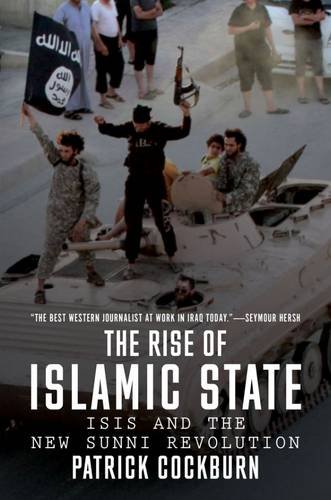◄►◄❌►▲ ▼▲▼ • B下一个新评论下一个新回复了解更多
In one sense everybody, supporters and opponents of the war in Iraq, got it wrong. Opponents denounced US plans to impose neo-imperial control the country. Supporters spoke of the good things the US planned to bring to the Iraqi people once Saddam Hussein was overthrown.
It was only as the looting of Baghdad continued week after week and the US visibly failed to get control of the situation that the bizarre truth emerged: Washington does not have any real plans for Iraq at all. It is making up its policy as it goes along.
Everywhere there are signs of the breakdown. A few weeks ago I nervously drove from Baghdad to Amman in Jordan along the great highway through the western desert of Iraq. As we passed looters, their elderly pick-ups and taxis piled high with junk, I wondered if it would occur to any of them that they could make a lot more money by stealing our car at gun point than they could by stripping old Iraqi government offices of broken chairs and battered filing cabinets.
But even then I thought that the phenomenon was probably temporary. At some point the Americans, whom we could see assiduously checking the papers of aid convoys from Jordan, would surely feel bound to secure the most important land route leading to Iraq. In fact it has got worse. Even tough Jordanian drivers, who drove to Baghdad at the height of the bombing, now often refuse to travel the road because of fear of armed bandits.
Paul Bremer, the new US viceroy in Iraq, who abruptly replaced retired Gen Jay Garner last week, has supposedly started a new tough policy, holding looters for 20 days and sacking some 15,000 to 30,000 former Baath party members. It is probably all too late. With at least 60 per cent of the Iraqi population destitute before the war, according to the UN, brief detention by US troops is not going to end the looting.
The US has largely wasted any political capital it gained with Iraqis for overthrowing Saddam Hussein. Iraqis remember that after the Gulf War in 1991 the Iraqi administration, vicious though it was, did a better job than the US in restoring electricity and water.
If the US was so uninterested in what happens in Iraq after the war why on earth did it fight it in the first place? After all it paid an immense diplomatic price in terms of the disruption or destruction of its traditional alliances. George W Bush and Tony Blair tend to treat their previous justifications for the war as a bit of ancient history, but they matter still because they are pointers to what may now happen in Iraq and the rest of the Middle East.
The US seems to have fought the war essentially because it wanted a war. It did so because the political fuel on which present US administration runs is to emphasise the external threat. Through this means it has won control of the Senate and may well win the next presidential election.
Other explanations for the war do not really work. Some US oil companies may have wanted to get a share of Iraq’s oil wealth. But even they need a measure of security to exploit Iraqi oilfields as some western oilmen dolefully point out . They are also nervous that it is becoming more and more dangerous to be an American, or indeed any other type of westerner, anywhere in the Middle East.
There is nothing particularly strange or unique to the US about the willingness of its government to exploit the sense of external threat felt by Americans since the attacks on the World trade Centre and the Pentagon in 2001. Most governments anywhere in the world, if they thought they could get away with it, would like to hold a ‘khaki’ election in which they could wrap the flag around them and traduce their opponents as unpatriotic.
The difference in the US today is that the civilian leadership of the Pentagon, notably Donald Rumsfeld and Paul Wolfowitz, are uniquely reckless, arrogant and ill-informed about Iraq. At the end of last year Wolfowitz was happily saying that he thought the Iraqi reaction to the capture of Baghdad would be much like the entry of the US army into Paris in 1944. He also apparently believed that Ahmed Chalabi, the leader of the Iraqi National Congress, then as now one of the most unpopular men in Iraq, would be the Iraqi Charles de Gaulle.
These past mistakes matter because the situation in Iraq could easily become much worse. Iraqis realise that the Saddam may have gone but the US does not have real control of the country. Last week, just as an emissary of Mr Bremer was telling academics at Mustansariyah, the ancient university in the heart of Baghdad, who should be purged from their staff several gunmen, never identified, drove up and calmly shot dead the deputy dean.
There will be more such attacks. They may not be on a large scale. But the tendency is for the present administration in Washington to respond to any threat by escalating its rhetoric and over-reacting. It would not take much for President George W Bush to start describing bomb attacks or assassinations in Iraq as as one more example of the long arm of al-Qa’ida or the Iranian government.
Supposed links between Saddam Hussein and al-Qa’ida, heavily publicised by the White House before the war, were largely journalistic concoctions. But in the present anarchy in Iraq al-Qa’ida will find that Iraq, where people are suffering all the disadvantages of occupation but without civil order, a fertile recruiting ground.
PATRICK COCKBURN 是 Andrew Cockburn 的合著者走出灰烬:萨达姆侯赛因的复活“。

 RSS
RSS








